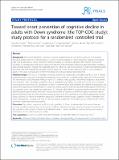Files in this item
Toward onset prevention of cognitive decline in adults with Down syndrome (the TOP-COG study) : study protocol for a randomized controlled trial
Item metadata
| dc.contributor.author | Cooper, Sally-Ann | |
| dc.contributor.author | Caslake, Muriel | |
| dc.contributor.author | Evans, Jonathan | |
| dc.contributor.author | Hassiotis, Angela | |
| dc.contributor.author | Jahoda, Andrew | |
| dc.contributor.author | McConnachie, Alex | |
| dc.contributor.author | Morrison, Jill | |
| dc.contributor.author | Ring, Howard | |
| dc.contributor.author | Starr, John | |
| dc.contributor.author | Stiles, Ciara | |
| dc.contributor.author | Sullivan, Frank | |
| dc.date.accessioned | 2018-02-27T11:30:07Z | |
| dc.date.available | 2018-02-27T11:30:07Z | |
| dc.date.issued | 2014-06-03 | |
| dc.identifier | 249969875 | |
| dc.identifier | 6e977320-70f0-40ce-aa5a-e0de32bbdaaf | |
| dc.identifier | 24888381 | |
| dc.identifier | 84902649164 | |
| dc.identifier.citation | Cooper , S-A , Caslake , M , Evans , J , Hassiotis , A , Jahoda , A , McConnachie , A , Morrison , J , Ring , H , Starr , J , Stiles , C & Sullivan , F 2014 , ' Toward onset prevention of cognitive decline in adults with Down syndrome (the TOP-COG study) : study protocol for a randomized controlled trial ' , Trials , vol. 15 , 202 . https://doi.org/10.1186/1745-6215-15-202 | en |
| dc.identifier.issn | 1745-6215 | |
| dc.identifier.other | PubMedCentral: PMC4061534 | |
| dc.identifier.other | ORCID: /0000-0002-6623-4964/work/33508500 | |
| dc.identifier.uri | https://hdl.handle.net/10023/12799 | |
| dc.description | This study is funded by the Chief Scientist Office, Scottish Government Health Department (reference: CZH/4/626). JS is funded by the NHS Lothian R&D Directorate. | en |
| dc.description.abstract | BACKGROUND: Early-onset dementia is common in Down syndrome adults, who have trisomy 21. The amyloid precursor protein gene is on chromosome 21, and so is over-expressed in Down syndrome, leading to amyloid β (Aβ) over-production, a major upstream pathway leading to Alzheimer disease (AD). Statins (microsomal 3-hydroxy-3-methylglutaryl coenzyme A reductase inhibitors), have pleiotropic effects including potentially increasing brain amyloid clearance, making them plausible agents to reduce AD risk. Animal models, human observational studies, and small scale trials support this rationale, however, there are no AD primary prevention trials in Down syndrome adults. In this study we study aim to inform the design of a full-scale primary prevention trial. METHODS/DESIGN: TOP-COG is a feasibility and pilot double-blind randomized controlled trial (RCT), with a nested qualitative study, conducted in the general community. About 60 Down syndrome adults, aged ≥50 will be included. The intervention is oral simvastatin 40 mg at night for 12 months, versus placebo. The primary endpoint is recruitment and retention rates. Secondary endpoints are (1) tolerability and safety; (2) detection of the most sensitive neurocognitive instruments; (3) perceptions of Down syndrome adults and caregivers on whether to participate, and assessment experiences; (4) distributions of cognitive decline, adaptive behavior, general health/quality of life, service use, caregiver strain, and sample size implications; (5) whether Aβ42/Aβ40 is a cognitive decline biomarker. We will describe percentages recruited from each source, the number of contacts to achieve this, plus recruitment rate by general population size. We will calculate summary statistics with 90% confidence limits where appropriate, for each study outcome as a whole, by treatment group and in relation to baseline age, cognitive function, cholesterol and other characteristics. Changes over time will be summarized graphically. The sample size for a definitive RCT will be estimated under alternative assumptions. DISCUSSION: This study is important, as AD is a major problem for Down syndrome adults, for whom there are currently no effective preventions or treatments. It will also delineate the most suitable assessment instruments for this population. Recruitment of intellectually disabled adults is notoriously difficult, and we shall provide valuable information on this, informing future studies. TRIAL REGISTRATION: Current Controlled Trials ISRCTN Register ID: ISRCTN67338640 (17 November 2011). | |
| dc.format.extent | 14 | |
| dc.format.extent | 565066 | |
| dc.language.iso | eng | |
| dc.relation.ispartof | Trials | en |
| dc.rights | © Cooper et al.; licensee BioMed Central Ltd. 2014. This article is published under license to BioMed Central Ltd. This is an Open Access article distributed under the terms of the Creative Commons Attribution License (http://creativecommons.org/licenses/by/4.0), which permits unrestricted use, distribution, and reproduction in any medium, provided the original work is properly credited. The Creative Commons Public Domain Dedication waiver (http://creativecommons.org/publicdomain/zero/1.0/) applies to the data made available in this article, unless otherwise stated. | en |
| dc.subject | Alzheimer disease | en |
| dc.subject | Dementia | en |
| dc.subject | Down syndrome | en |
| dc.subject | Neuropsychology | en |
| dc.subject | Primary prevention | en |
| dc.subject | Simvastatin | en |
| dc.subject | Statin | en |
| dc.subject | RC0321 Neuroscience. Biological psychiatry. Neuropsychiatry | en |
| dc.subject | SDG 3 - Good Health and Well-being | en |
| dc.subject.lcc | RC0321 | en |
| dc.title | Toward onset prevention of cognitive decline in adults with Down syndrome (the TOP-COG study) : study protocol for a randomized controlled trial | en |
| dc.type | Journal article | en |
| dc.contributor.institution | University of St Andrews.School of Medicine | en |
| dc.contributor.institution | University of St Andrews.Population and Behavioural Science Division | en |
| dc.identifier.doi | 10.1186/1745-6215-15-202 | |
| dc.description.status | Peer reviewed | en |
This item appears in the following Collection(s)
Items in the St Andrews Research Repository are protected by copyright, with all rights reserved, unless otherwise indicated.

